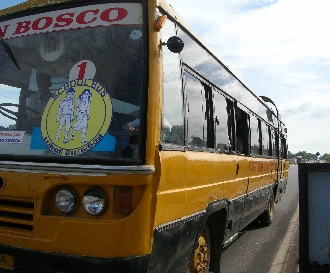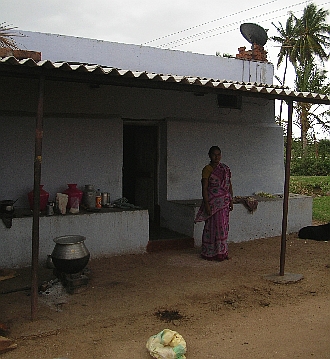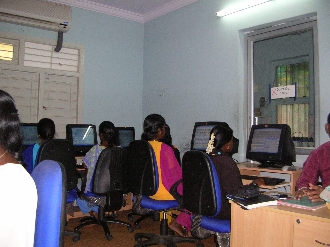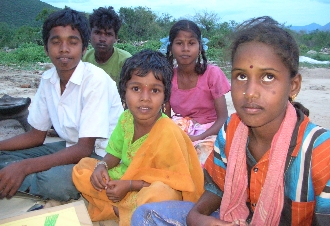The Sukkurs' day begins at 5.30 a.m. like most working parents' does. The couple, who live in Uthangarai town in Krishnagiri district, prepare for the school day and their work day readying breakfast, lunch and snacks for their second daughter Asia, 13. She leaves for school at 8.00 am with the parents traveling to Chengam district in Thiruvannamalai, an hour's journey from home. Their job, as community mobilisers for an NGO, keeps them at work well past 6 pm on days. But it is their daughter, a class 9 student, who returns from school later than them.
Asia goes to a private matriculation school that has joined the rank of schools in Krishnagiri that churn out state toppers. One school claims to have sent all their students to either medical or engineering colleges. Asia aspires to join a professional course too, following the footsteps of her older sister Ayesha, an Engineering student and an alumna of the same school.
 Buses of Matriculation school reach the most remote villages in Krishnagiri to pick up students, while students of government schools often face the prospect of trekking kilometres through hostile terrain to reach schools. Pic: Krithika Ramalingam.
Buses of Matriculation school reach the most remote villages in Krishnagiri to pick up students, while students of government schools often face the prospect of trekking kilometres through hostile terrain to reach schools. Pic: Krithika Ramalingam.
R Chitra Devi, their mother, says government schools with their Tamil medium education does nothing to ensure a good career path or ensure employment. Private schools using state curriculum are not challenging enough. Matriculation schools are the only English medium schools available to most parents who aspire for a better lives for their children. When the school ensures an entry into professional courses, then long school hours are a good price to pay," she adds.
The drill mill
The matriculation schools intensively drill their children and prepare them from board examinations in class X and Class XII, by altogether skipping the curriculum for Classes 9 and XI. Schools issue books for class IX and XI, but ask the students to also buy the next year's books. The students are then coached on the higher classes' syllabus for the next two years till the answers become second nature to them, said Abdul Sukkur, Asia's father.
In Krishnagiri, Dharmapuri, and Thiruvannamalai once considered backward educational districts there has been a steady increase in the number of matriculation schools. Many are residential, some day schools, most offering hostel facilities to those from other districts. School hours range between 10 and 14 in the higher classes. Often three or four students rent a home near the school with one parent staying with them to look after their needs. Fees are Rs.50,000 upward and accountability to parents or authorities non-existent.
Some schools get a disclaimer from the parents that anything that happens to the child within the school premises can't be the responsibility of the school. Yet, around 3,500 to 5,000 students study at each of this school. When professional courses become the only way to ensure a reasonable living, parents make that choice for their children," says Sukkur.
In Dasapatti, village in Pennagaram block of Dharampuri, the Madiahs have made the same choice for their son Vijay*. Madiah is a marginal land holder and makes much of his living from selling tea on his cycle and Nagaselvi works on their field when not brewing tea for her husband's business. But their son, a class 9 student, is sent to a residential school in the neighbouring Namakkal district. The residential school in Rasipuram had got a few state ranks. He (Vijay) was losing his discipline here because of his friends and his mark started slipping. So we put him where we know he will be made to work hard. Yes, he does miss us, but we try and make his stay there special," says a resigned Nagaselvi.
They pay upward of Rs.24,000 for the hostel and another Rs.28,000 as school fees per year, money that small farmers can hardly afford. Austerity measures mean the older sister does not get the education she wants Shanta* (name changed) attended a Tamil medium school and now studies English Literature in a private college. She is finding it difficult there (in classes) when all her classmates have an advantage, but she does want to be a lecturer and thinks we (parents) have played favorites with Vijay, adds Nagaselvi.
 The humble residence of the Madiahs is home to many a dreams. They send their 9th grader son to a private residential school in the hope that he will enter professional courses. Pic: Krithika Ramalingam.
The humble residence of the Madiahs is home to many a dreams. They send their 9th grader son to a private residential school in the hope that he will enter professional courses. Pic: Krithika Ramalingam.
At Pennagaram, access to government schools is still poor and the number of English-medium schools that are affiliated to other boards limited. At Kulipatti village near Kotturmalai around 28 children between the ages of 6 and 14 were out of school. The government school is on the other side of a catchment area that flooded during both South West and North East monsoon as the area receives rain between July and December. But with Matriculation schools starting in the area, school buses go right up to remote village to pick up children," says M Shankar of Development Education and Environment Protection Society.
Of the many streams in Tamilnadu, Matriculation schools have grown considerably over the last 4-5 years. A 17.51 lakh students were enrolled in matriculation schools in the state in 2004-2005, which stood at 23.13 lakh in 2008-2009, according to the State School Education Department statistics. In Krishnagiri, matriculation schools make up one-third of all un-aided schools (which don't receive grant from the government) at 69 of 220 schools, but parents I spoke to say the number is not representative as many schools had opened four to five years ago that do not have upper primary or higher classes have said they will affiliate themselves with the Matriculation board. If it is English-medium education, then it has to be Matriculation schools," says R Anuradha, the Sukkurs' colleague at Association of Rural Communities for Development.
Tamil or other local language medium of instruction means the students stand a chance of getting only government jobs. The choice is between teachers and other revenue department posts. Vocational training has been ignored in the favour of higher education in colleges, which fail to equip the students with knowledge and skill set involving computers and English language," she says.
In Krishnagiri, Thiruvannamalai and Dharmapuri districts, I meet many a youth who has a diploma or degree in Education that qualifies them to be teachers. Or they are readying themselves for Tamilnadu Public Services Commission examinations.
In Pennagaram, Dharmapuri, I meet two 20-somethings, C Veeramani and S Urvashi(*), who despite their degrees have been unable to find a work that matches their qualification. Urvashi scored 1045 on 1200 in the State Board exam and has a B.E. in Electronics and Communication Engineering. Today she works as personal assistant to a Highways Road contractor for a salary of Rs 2,500. At the many interviews I have been to after graduation, I was often told my English language skills are poor. The soft skills training imparted in the college was not sufficient", she says. Today Urvashi's only hope for a decent earning is sitting for the government revenue department examinations.
SERIES
• Zip through class V
• Alternative education shackled
• Malnutrition hits schooling -I
• Malnutrition hits schooling -II
• Bonded and bundled out
• Many bridges to cross
• Pushing to English medium ![]() Veeramani, a graduate in Botany, has also been finding the going tough in getting gainful employment. Currently working with DEEPS in their watershed management project, Veeramani is equipping himself with another skill set computer applications. I started working as a painter alongside my friends on graduation. We worked in Bangalore and other urban areas. My friends then told me there is a lot of scope for teachers, so I got a teacher training diploma from Varuvan Vadivelan (teacher training college) after paying Rs.60,000 as fees. I've registered with the Teachers Recruitment Board and I have been told I stand a chance only in the year 2015," says Veeramani. He now hopes his computer applications qualification will get him a good job in the interim.
Veeramani, a graduate in Botany, has also been finding the going tough in getting gainful employment. Currently working with DEEPS in their watershed management project, Veeramani is equipping himself with another skill set computer applications. I started working as a painter alongside my friends on graduation. We worked in Bangalore and other urban areas. My friends then told me there is a lot of scope for teachers, so I got a teacher training diploma from Varuvan Vadivelan (teacher training college) after paying Rs.60,000 as fees. I've registered with the Teachers Recruitment Board and I have been told I stand a chance only in the year 2015," says Veeramani. He now hopes his computer applications qualification will get him a good job in the interim.
Tamilnadu has a total of 1.13 lakh graduates in Education (or those with Bachelors in Education degree) and 1.06 lakh secondary grade teachers and 1.22 lakh post graduate teachers registered at the employment exchanges. A recruitment freeze that was in effect till 2006 was recently lifted and teachers are being taken in on the basis of their seniority. Veeramani tells me around 90 colleges for teacher training exist in the combined district of Dharmapuri and Krishnagiri each turning out around 50 trained teachers every year. The TTIs across the border in Karnataka are more popular as they charge half of fees of Tamilnadu TTIs.
With Tamil medium education many find that teaching in schools is all they are qualified to do. Also, in the western districts (Salem, Namakkal, Dharmapuri, Krishnagiri, Thiruvannamalai), the youth believe there will be a huge recruitment drive for teachers. These districts have the highest number of teachers training institutes," he says.
Swapping the blackboard for the keyboard
S Abdul Wahid of Quaid-E-Millath Nagar, Chengam was in the same boat as Veeramani, but today he has given up on his dream of being a school teacher. He instead works for one of the few rural BPOs in Tamilnadu. A degree in commerce, certificates in computer applications and a teacher training diploma was all brought to nought in the employment scene. I worked odd jobs to help my farmer parents with expenses, but jobs for my education qualifications never came, says Wahid.
 A view of the 120 seater rural BPO at Chengam that offers employment opportunities to many a rural educated youth. Pic: Krithika Ramalingam.
A view of the 120 seater rural BPO at Chengam that offers employment opportunities to many a rural educated youth. Pic: Krithika Ramalingam.
It was then the Chengam panchayat union started computer applications, English language and soft skill training for those who had completed class 12 under the Rashtriya Sam Vikas Yojana (RSVY). When jobs were still not forthcoming, the Panchayat Union Chairman G Kumar started a rural BPO to give employment to those who were trained under the government scheme. Today, Paramount InfoTech is a 120-seater KPO/BPO that does non-voice data entry work.
M Subramaniam, Manager says, the BPO now does search engine optimisation for newspapers, data entry for census work. Voice based work involves a good command over language and also an ability to think on the feet, which the rural students do not have. Most of our staff is from government and corporation schools with their Tamil-medium instruction do not have the confidence to start a casual conversation in English," he says.
I meet many first generation women white collar women workers. Many from the Muslim community tell me it would have been very difficult for them to convince their parents to let them work in another town. With the Rural BPO things have changed.
Eighteen-year-old A Hazeena, whose father earns a livelihood as the village tailor, says despite two other programming diploma, she did not find any employment. My parents had both studied only till class IX and wanted to see me as a Software Engineer, so I studied C, C++, SQL. But when that did not get me any jobs, I was reluctant to attend another training (RSVY). Thanks to the exposure from this job, I am more confident of joining a degree course and earning my living in the IT field," she says.
Tough act to follow?
So, why is it difficult to replicate this example elsewhere? Chengam Panchayat Union chairperson Kumar says private players don't want to start rural BPOs. Many were intimidated at the lack of good talent, given the reputation of rural schools. There were no subsidies, no incentives for starting the rural BPO. An NGO helped me get a loan from a nationalised bank and the BPO was born in my Panchayat office with 10 computers," he says. Two years since then, Kumar has recovered his costs and his gives employment to many from backward communities, some of them women who have been abandoned by their marital families and other first generation learners like Wahid.
While Tamilnadu has announced it will frame a rural BPO policy, there has been very little private enterprise in starting rural BPOs. With only two other successful BPOs run by the Krishnagiri district administration in Sanasandhiram and Uthangarai, the need to start more rural BPOs is becoming more urgent. Shankar of DEEPS says migration is close to 30 percent in the three districts in some villages, half the families have moved out. Migration brings with it its own set of issues HIV/AIDS in the migrant community is high, there is little security about food, education or livelihood. Families are split and the children pay the heaviest price. There is an urgent need to find local employment rural educated youth," says Shankar of DEEPS.
Some things don't change
Progress is still leaving out many in the rural communities. In other parts of Chengam block and neighbouring parts of Dharmapuri district, the issues are still the same. Fourteen-year-olds who read at the level of primary school students, many who don't get a chance to go to school, poor facilities.
At Kurumapatti, 30 kms from Chengam block headquarters, I meet Irula children who have never been to school. The problems are the usual ones: poor bus service to this remote area a 2 kms-walk to the primary school, lack of ICDS facilities, poor awareness amongst the Irulas. Mobilising admissions has been difficult, says T Devendiran of Gandhi Kasturbha Village Development Society (GKVDS) which runs Non-formal Education centres at Kurumapettai.

![]() Fourteen-year-old Yuvaraj (first from left) attends the evening NFE classes conducted by GKVDS at his village, Kurumapatti. This is the first school for Yuvaraj, where he has learnt to read and write in the last two years. His dream of joining a school, however, has still not come true. Pic: Krithika Ramalingam.
Fourteen-year-old Yuvaraj (first from left) attends the evening NFE classes conducted by GKVDS at his village, Kurumapatti. This is the first school for Yuvaraj, where he has learnt to read and write in the last two years. His dream of joining a school, however, has still not come true. Pic: Krithika Ramalingam.
Sandwiched between the Pennai river and hills of the Western Ghats, the villagers are isolated from the mainstream, preferring to let their children tend goats and cattle. Children's only contact with the outside world is the evening classes run at the village at the home of GKVDS educator G Karthikeyan. He spends the early evening rounding up the 30-odd children. The agenda for the class is set by the students. They chose what they want to learn, that is the only way to keep the children in the class," he says.
The education material is poor, but the instructors improvise on a daily basis to keep the attention of the first generation learners. Fourteen-year-old K Yuvaraj, who has been to the classes for the last two years and can now read sentences in Tamil. He wants to go to school, but the NGO finds it difficult to accommodate him into school given his age. Two others who were enrolled in Kurumapatti panchayat schools S Sona and S Sembaruthi this June are no longer going to schools because the non-formal education programme of the NGO is not accredited by the Sarva Siksha Abhyan (Universal Primary Education) Programme as a bridge course.
Other NGOs say hiccups like this are few and far in between and the SSA programme has worked well in keeping children in school. Official numbers are 5505 children in Dharmapuri, 8667 in Krishnagiri 8667 and 4456 in Thiruvannamalai out of school children. With the rolling in of the universal secondary education programme, Shankar thinks the districts can do only better on education parameters. In his words: What would be important is to look at rural employment and structuring courses to ensure that even those who complete secondary schooling are employable.























